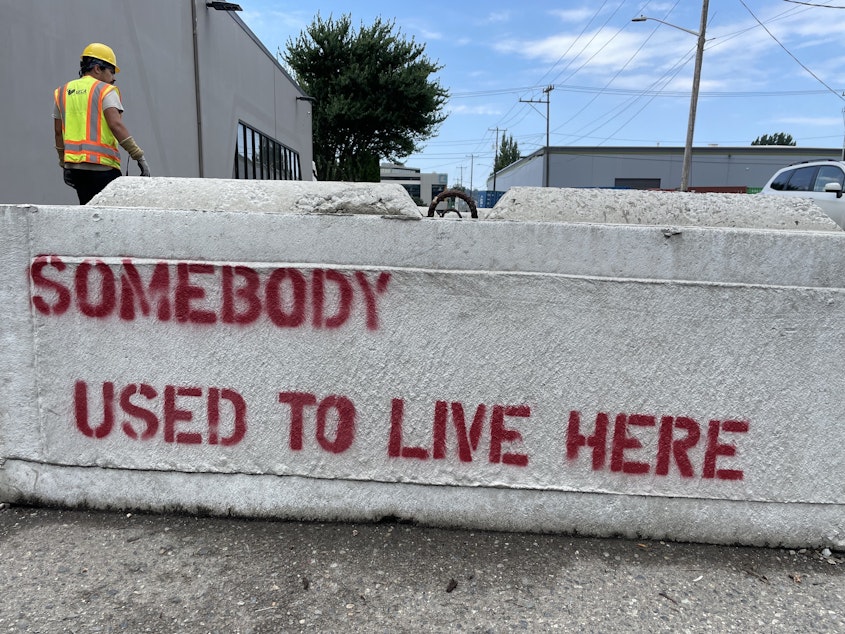The West returns to Seattle: Today So Far
- What music Today So Far readers suggest for newcomers.
- The West Seattle Bridge is back up and running.
- Narcan vending machines come to Pierce County.
This post originally appeared in KUOW's Today So Far newsletter for September 19, 2022.
“It’s been a huge pain in the butt!”
That's what West Seattle resident Deborah Wolf told KUOW's Natalie Newcomb while discussing how long the West Seattle Bridge has been out-of-commission.
With the bridge down, a 12-minute trip between West Seattle and SoDo or downtown turned into a 45-minute trip, at least. Wolf said the bridge's absence turned West Seattle into an "accidental island.” For example, Wolf had to switch all her doctors from Seattle-based offices to West Seattle offices. Otherwise, she'd be on the road for two hours for an appointment.
Well, now the West Seattle Bridge is open! Commuters probably know this from the eruption of cheers Sunday, or from the 100,000 drivers estimated to use the bridge each day. Those who haven't evolved to work from home, or who have the option, will be rolling onto the commute.
This also means that the rest of Seattle can return to the West, which in turn means that Bill Brown can finally tell his sons Noah and Liam they can go to Alki Beach. The family lives in Greenwood. They bought a kite to fly at Alki, but haven't been able to use it while the bridge was down. The usual 20-minute drive would have take far longer.
“They've been asking me for three years to go back," Brown said. "And I'm like, 'No, no, no, we'll wait.' So we're happy it's back.”
"It's an otter kite and we literally just bought it," Liam told KUOW.
Seattle Now notes that more than 600 people have died from overdoses in King County this year. In cities, naloxone (or the brand name Narcan) has become well-known. The drug, often carried by 911 responders, can reverse an overdose. But in more rural areas, it can be more difficult to get. That's why places like Orting in Pierce County are now using Narcan vending machines.
It's exactly what it sounds like — a machine that dispenses an overdose-reversing drug.
"Here in Orting, we're a rural community so there is not a lot of services or access to other services around us," said Recovery Cafe’s Rena Thompson. "... it's about 30 minutes to a hospital or a treatment center."
One such vending machine is located at the Recovery Cafe.
"The vending machines have Narcan for free," Thompson said. "...in our case, they'll come in our front door, go to the vending machine, push the button like any other vending machine, the Narcan is dispensed, and you get to take that and use it when needed."
Thompson further tells Seattle Now that Narcan is available through pharmacies, but not everybody uses them. There's also an embarrassment factor when going in-person to ask for the drug. The vending machines aim to mitigate these barriers. Check out the full story on Seattle Now.
I reached out to TSF readers last week for music recommendations aimed at Seattle newcomers (specifically SDOT's new Director Greg Spotts). Readers have spoken, and I'm impressed/disappointed. There are some solid suggestions here, but not one mention of Queensrÿche.
Diane points to Sleater-Kinney. Katt's number one music rec is always Brandi Carlile. Sir Mix-a-lot got a shoutout from Alex. And the Blue Scholars' song "Joe Metro" was singled out by Luke. That's just a handful of what came in. Check out the full list here.
I'm going to keep the call open for Northwest music recommendations, just in case someone wants to bring up Queensrÿche.
AS SEEN ON KUOW

Throughout Georgetown and Sodo "eco-blocks" are being placed to keep vehicles and encampments from cropping up. Placing these blocks without a permit is illegal, though the Seattle Department of Transportation frequently struggles to know who is placing them. After Soundside initially reported on the blocks, one local business owner reached out to say that they know the blocks are illegal, but so is a lot of other unchecked activity in the area. They said they placed the blocks to protect customers and employees. Read more here.
"I know it sounds like it's a lot of complaining, but it's real for the people that are here," the business owner said. "And it seems like that voice doesn't get heard a lot of times ... All the people that advocate how we're taking this away from the poor, or the homeless worldwide, how many of them – how fast would someone on the City Council – get on the phone and get removed the vehicle that showed up at their yard?" (Libby Denkmann / KUOW)
DID YOU KNOW
I very slightly joked about Queensrÿche above, mostly because any band who passed through that era of big hair and spandex gets a little humor from me. The truth is that spandex is a blip on Queensrÿche's decades-long career that is still going to this day (they're more leather metal now).
When Queensrÿche formed in Bellevue in 1980, music from the region was spotty when it came to the national stage. We had Jimi in the '60s and Heart in the '70s. It makes sense that a homegrown sound eventually formed — we did it for ourselves. So when Queensrÿche emerged to become a global success in the 1980s, it was pretty cool. The band evolved the progressive metal genre, and has since sold 20 million albums worldwide, and has earned three Grammy nominations. You might recognize songs like "Jet City Woman" or "Silent Lucidity" showing up on classic rock stations.
Despite some lineup changes, Queensrÿche continues to record and perform to this day. The band's 16th album, "Digital Noise Alliance" is slated to be released in October.
ALSO ON OUR MINDS

New report finds a coordinated rise in attempted book bans
Throughout the 2021-22 school year, more than 1,600 book titles were banned, according to a new report by the group PEN America, which advocates for freedom of expression. According to the report, the surge in book bans is a result of a network of local political and advocacy groups targeting books with LGBTQ+ characters and storylines, and books involving characters of color.

